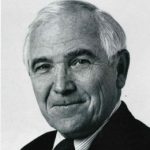If genius is the ability to see things in a different way, then Michael M. Carey certainly qualifies as a genius. Carey, the now-retired Detroit manager of Time Magazine and a 1992 recipient of a Distinguished Service Citation from the Automotive Hall of Fame, had the vision to see something in a different way back in 1970- and the result was one of the most visible dealer recognitions in the country. “It was September of 1970 when I received a phone call from another advertising person, telling me that the Saturday Evening Post was folding,” he says. “I knew immediately that probably meant that the Ben Franklin Award, which the Post had always given to an outstanding car dealer, was probably also shutting down.”
Carey immediately went to his superiors with a plan to begin Time’s own dealer award to replace the Ben Franklin Award – but with some key differences. “We asked ourselves, ‘What could be done to improve the Ben Franklin Award?”‘ he says. “We wanted to improve on it, not just duplicate it.” Two areas of possible improvement were immediately obvious to Carey and his Time colleagues. “First of all, the other award did not include community involvement as one of the criteria for selection to the award,” he explains. “Secondly, the Ben Franklin Award was presented to only one dealer. We thought that was too limiting.” So Carey proposed to Time management that it begin the Time Quality Dealer Award Program, arguing successfully that it would augment the magazine’s leadership role in the industry and that it would foster a solid relationship with the National Automobile Dealers Association (NADA). ”We decided to do the program for two reasons,” Carey says. “First of all, because of the association and recognition it would give us. But just as importantly, we realized it would be a benefit to dealers and, hopefully, to the industry.”
At the time, car dealers suffered from a less-than-sterling image, and were often criticized for slipshod business operations and for a lack of concern about their customers. Conversely, the Time program sought to recognize and honor those dealers who were model citizens in their communities and who put customer satisfaction at the top of their priority list.
‘The emphasis of the Time award,” he says, “is on being a good business person and a good community person. It’s not a one-faceted award any more.” It is no longer limited to one dealer. Independent industry sources elect 50-60 Quality Dealers. Ten are selected as finalists, and one is chosen as the Time Quality Dealer of the Year. The judging, since the award’s inception, has been handled by the University of Michigan School of Business and is completely independent of Time’s control. The award, Carey says, has been of benefit to the industry as well as to Time. “First of all, we’re willing to attach the name of the magazine to the automotive business, and that carries certain benefits,” he says. ”We support the program with trade ads, press releases, etc., and we also allow recipients of the award to use the Time symbol in their advertisements.”
Carey believes the award’s prominence has helped the industry in another, less tangible way. “I think that the recognized value of the award has made some people aware of their own shortcomings,” he says. “I believe some have said, ‘If I want to be considered for that award, I have to become an outstanding dealer in all respects.”‘ Despite its prominence today, the Time award always didn’t enjoy such notoriety among the industry. In fact, Carey recalls an early award presentation in 1973 in San Francisco.
‘The presentation was scheduled to occur in the San Francisco Opera House on late Tuesday afternoon,” he says, “and I was quite excited about it. I expected to speak to a full house and have the recipient come up to a thunderous ovation. “It didn’t happen quite that way,” he recalls. ”When I got up to the podium to make the presentation and I looked out over the audience, all that were left were the recipients, their spouses, their children, and three cleaning ladies (but they were quality cleaning ladies) .. .1 guess you could say in those days, we were an add-on.”
Nowadays, of course, it’s different. The Time award is presented between the farewell address of the outgoing NADA president and the guest speaker for the entire NADA convention. Besides that change, Carey has seen others during his tenure managing the award. “At first, the emergence of the megadealer had little impact on our program,” he says. “Smaller dealers continued winning the award. But about five years ago, this changed, and since then, an increasing percentage of the recipients have been megadealers.”
Carey’s involvement in the auto industry goes beyond the Time Quality Dealer Award program. He served as manager of the Time’s Detroit advertising office since 1973 until his retirement in 1987. At that time, advertising revenues for which he was responsible had reached $50 million annually, a 12-fold increase that from the time he had joined the magazine. Another example of Michael Carey seeing things a bit differently – and succeeding.
